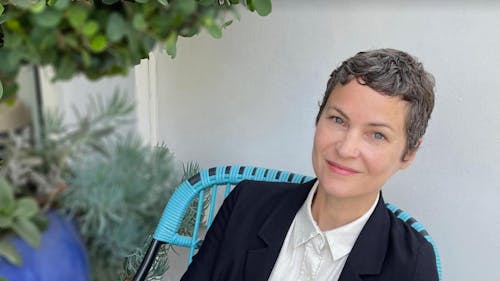U. professor receives Haskins Medal for book on gender in medieval Europe

Leah DeVun, a professor in the Departments of History and Women, Gender and Sexuality Studies, was recently awarded the Haskins Medal by the Medieval Academy of America for her book, "The Shape of Sex: Nonbinary Gender from Genesis to the Renaissance."
The Medieval Academy of America highlights scholars for their significant contributions to medieval studies and awards the Haskins Medal to those who have written books in the discipline.
"It's a surprise and a thrill that the scholars who I've admired, who've had a big impact on my work, have won this in the past," DeVun said. "So, I feel like it's almost unbelievable to be in their company, and I'm really grateful and thrilled."
DeVun said their research focuses on the history of gender studies and science in premodern Europe. In their latest book, they explore concepts such as theology, law and medicine and use them to explore how the gender binary was perceived at the time.
"At the heart of the book is the study of people, individuals, who, because of their bodies or because of their behavior were described at the time as not fitting into simple categories of maleness or femaleness," they said.
DeVun said some of the texts they examined from the medieval period did not agree with a strict gender binary and, instead, demonstrated that it was a fluctuating concept.
Before DeVun decided to join the education field as a professor, they said they had been involved in LGBTQ+ activism as an undergraduate student. DeVun said their experiences with the intersection of queer communities, religion and medicine, and their personal life inspired them to study this relationship in a historical context.
"I became very interested in digging into a deep history of how we cope with these different kinds of categories ... and how (people) managed by all those institutions ... and how early ideas about Christianity, gender and sexuality continue to shape how people are perceived," they said.
DeVun said that one of their goals for the future is to plan more opportunities for undergraduate and graduate students to study and research history while also making livable wages. They said there are many students who have an interest in researching queer studies, and supporting them is essential to foster development in the field.
In the Fall 2024 semester, DeVun will be teaching the course "Gender and Art" under the Department of Women, Gender and Sexuality Studies. The course will feature transgender, queer and nonbinary artists who have helped shape the art industry.
DeVun said that to explore transgender or queer studies, one should get involved within the community and make an effort to get to know and understand others with different perspectives.
"Give people your attention in person, face-to-face," they said. "I think that is going to help us find common ground politically and also intellectually and personally, and I think that is so important for the ideas that we come up with in the University and the scholarly sorts of debates that we have."



